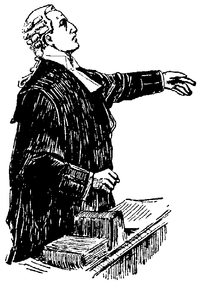Barrister

Illustration of an early 19th-century English barrister
|
|
| Occupation | |
|---|---|
|
Occupation type
|
Profession |
|
Activity sectors
|
Law Jurisprudence Justice Philosophy of law Politics Legal history Human rights Intellectual property |
| Description | |
| Competencies | Advocacy and interpersonal skills, analytical mind, critical thinking, commercial sense |
|
Education required
|
England and Wales: Bar Professional Training Course with pupillage (and possibly Common Professional Examination) |
|
Related jobs
|
Pupil barrister, advocate, judge, magistrate, attorney, solicitor |
A barrister (also known as barrister-at-law or bar-at-law) is a type of lawyer in common law jurisdictions who works at higher levels of court. Barristers mostly specialise in courtroom advocacy and litigation. Their tasks include taking cases in superior courts and tribunals, drafting legal pleadings, researching the philosophy, hypothesis and history of law, and giving expert legal opinions. Often, barristers are also recognised as legal scholars.
Barristers are distinguished from solicitors, who have more direct access to clients, and may do transactional-type legal work. It is mainly barristers who are appointed as judges, and they are rarely hired by clients directly. In some legal systems, including those of Scotland, South Africa, , Pakistan, India, Bangladesh, the British Crown dependencies of Jersey, Guernsey and the Isle of Man, the word barrister is also regarded as an honorific title.
In a few jurisdictions, barristers are usually forbidden from "conducting" litigation, and can only act on the instructions of a senior solicitor, who performs tasks such as corresponding with parties and the court, and drafting court documents. In England and Wales, barristers may seek authorisation from the Bar Standards Board to conduct litigation. This allows a barrister to practise in a 'dual capacity', fulfilling the role of both barrister and solicitor.
...
Wikipedia
